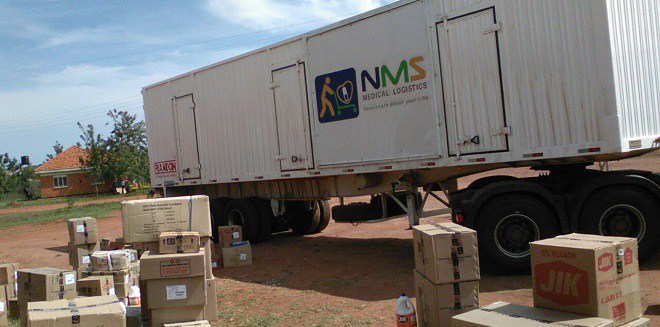
| A report has detailed how National Medical Stores (NMS) cheats tax payers by inflating cancer drugs sold to Uganda Cancer Institute (UCI).
NMS headed by Moses Kamabare is a government agency charged with the mandate toprocure, store and distribute essential medicines and medical supplies to all Public Health facilities in the Country including Uganda Cancer Institute (UCI). Before attaining its autonomy status through the Uganda Cancer Institute Act, 2016, NMS and have on several occasion protested the high cost of medicine from NMS compared to the market price. It should be remembered that in May 2016, Parliament passed the Uganda Cancer Institute Bill, 2015 in a bid to establish Mulago-based UCI as an autonomous agency of government mandated to undertake and coordinate the prevention and treatment of cancer and cancer related diseases and to conduct research in cancer, in Uganda. Currently, UCI is responsible for the procurement of cancer drugs that were initially procured and supplied to the Institute NMS. According to the 2018 report titled “Report on Procurement of Anticancer Medicines, Support Drugs, Sundries and Diagnostic Supplies at the UCI”, the cancer institute last year saved over Shs4.5bn after buying their own cancer medicines from other firms than if they had procured the same drugs from NMS. The report highlights some of the anticancer drug quotations which shows that in FY 2015/16, UCI bought drugs like Pegylated liposomal doxorubicin 20mg from NMS at Shs2,892,672m yet the same drug costs Shs221,507 at market price bring unit over charge at Shs2,671,165. In the same FY, NMS sold another drug-Goserlin 10.0mg(Zoladex 10.8mg) batch kx836 at Shs1,928,448 per unit and yet UCI last year bought the same drug from the market price at Shs1,243,248. Bortezomib 3.5mg is being sold by NMS at Shs9,320,832 yet it costs Shs8,898,690, Tretinoin 10mg caps is being sold by NMS at 5,469,936 yet it costs Shs4,220,344 at market price and Etoposide 50mg costs Shs702,095 from NMS while it costs Shs281,300 at market price. Other drugs are; Anastrazole 1mg tablet sold by NMS at Shs118,800, but cost UCI Shs8,398 from the market as supplied by Eris Sandoz EBW. Kimsy Medac supplied Capecitabine 500mg tablets to UCI at Shs365,750 per unit yet NMS would charge them Shs1,728,000. Another firm-Hetero supplied L-asparaginase at Shs78,000 yet NMS supplies at Shs410,400. Eris Pfizer supplied Oxalipation 100mg to UCI at Shs61,152 yet NMS supplies at Shs289,440. Hetero Labs supplies Daunorubicin 20mg vial at Shs24,000 per unit, but NMS charges Shs126,615 for the same. Apart from inflating cost of drugs, the UCI report also pinned NMS for supplying anticancer medicines of poor quality. In particular, the report cited out a drug such as cyclophosphamide 1g that had been supplied by NMS “but do not meet the pharmacopeia specifications.” Cancer is a growing health problem in Uganda registering over 5000 new patients at the facility which will soon or later be under new management-Mulago Specialized Hospital. Up to FY 2017/18, UCI was receiving both its specialized and basic drugs and diagnostic supplies through NMS. Due to increasing number of new cancer patients every year, the budget for UCI increased from Shs500m from FY 2010/11 to Shs7bn in FY 2013/14. In 2013/14, UCI was receiving about 2500 new patients even with a stagnate budget. |
